Last week, Rwandan president Paul Kagame was accused by one of his former allies of being the man responsible for the death of Juvenal Habyarimana.
Habyarimana was the president of Rwanda until 1994 when his plane was shot down.
His death is what set off the Rwandan genocide. Tuesday for the first time, President Kagame addressed a direct question about the accusation during a press conference.
Anchor Marco Werman talks to The World’s Mary Kay Magistad who attended the conference.
Read the Transcript
The text below is a phonetic transcript of a radio story broadcast by PRI’s THE WORLD. It has been created on deadline by a contractor for PRI. The transcript is included here to facilitate internet searches for audio content. Please report any transcribing errors to theworld@pri.org. This transcript may not be in its final form, and it may be updated. Please be aware that the authoritative record of material distributed by PRI’s THE WORLD is the program audio.
Marco Werman: Now on to Rwanda where President Paul Kagame is dealing with an explosive allegation made against him. A former ally has accused the President of being responsible for the event that set off Rwanda’s 1994 genocide. Theogene Rudasingwa said Kagame was behind the shooting down of the plane of former President Juvenal Habyarimana. The genocide that followed left an estimated 800,000 people dead. Today President Kagame held a press conference in Kigali. The World’s Mary Kay Magistad was there. She says Kagame only commented briefly on the accusations against him.
Mary Kay Magistad: He has been tweeting about this issue since the accusation was made. So it’s not the first comment he’s made on it. But what he said today was, “I am amazed by the idleness of some people in the media who spend a lot of time talking about nothing and nothing becomes something but still with no meanings. So I am not going to discuss this nonsense. The person who said it has something to do with his brain or in his skull and, if he wants to say something I can’t stop him. I have a country to run and I am going to get on with it.”
Werman: I am curious, Mr. Rudasingwa made these accusations early last week and Kagame has been tweeting about the accusation, and this is the first time…in fact, the first question that came up about this, and it was 35 minutes in to this press conference, I understand. What do you think this says about the willingness of Rwandans to talk about this part of their history?
Magistad: Well, Rwandan are willing to talk about this part of their history. It not like anyone thinks that there is a deep secret here. I think that they accept President Kagame’s earlier explanation which was, “Look, we were at war with the government at that point. If I wanted to shoot down a plane I could have, but I didn’t. If you look at the facts on the ground, what happened was the plane went down, 25 minutes later road barriers went up and minutes after that the genocide started. Hutu gangs started going house to house with lists already made of people to assassinate, most of them, at the beginning, Tutsi intellectuals and Hutu moderates. So why on earth woud I as the head of mainly Tutsi malitia want to trigger a genocide of Tutsi people? In Rwanda it just doesn’t make sense. Again, this is nonsense. Let’s move on and talk about the future of Rwanda.”
Werman: Once you are back out on the streets of Kigali, what do Rwandans have to say about Kagame? Do they say his leadership is worth the stronghand that many say he has brought to politics in Rwanda?
Magistad: It depends who you talk to. I think certainly in talking to journalists here, and I have talked to quite a few, and also people on the film side of the media community here, they don’t feel like they are being terribly oppressed. They feel that while there are limits to what they can say, certainly there are limits to hate speech in Rwanda as there are in Germany, that there is a pretty wide range of things that they can cover. For me, coming from China and talking to journalists here and talking to people on the streets, it feels freer. I am looking at it in somewhat relative terms but it’s certainly not a full-fledged open democracy where anyone can say anything. At the same time Rwanda is still a society that is getting over a genocide where people using the media to promote hate speech led to extraordinary devastation here. So you can see both sides of it. Ideally free speech is a good thing, on the other hand at what point do you say free speech stops at the point where you are shooting fire in a crowded theatre.

